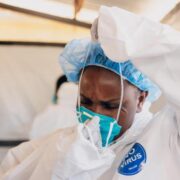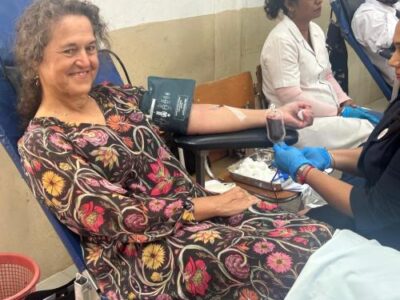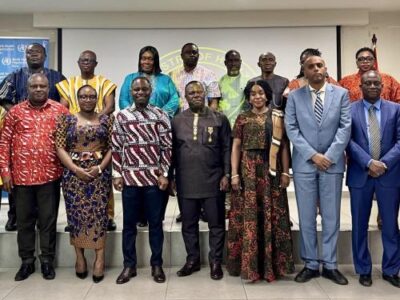Zomba – In the remote community of Tongwe, an island on Lake Chirwa in Zomba district, Malawi, a small crowd gathers under the shade of an old mango tree as health workers prepare for the day’s vaccination drive. Among them is Mercy Simate, 34, a mother of six.
She sits quietly, holding her four-month-old daughter, Victoria, on her lap. Today is a special day for Mercy and her youngest child. Victoria is about to receive her first doses of the Diphtheria, Tetanus, and Pertussis (DPT), Pneumococcal Conjugate, and Rotavirus vaccine.
“I am happy the vaccination services have been extended to us here on this island,” Mercy says, her voice warm but tired. “I kept postponing visiting the health centre as I was overwhelmed lately. Today, I am also receiving my COVID-19 booster doses. I have always been up-to-date with vaccinations, which I know is the best prevention.”
Mercy is not alone. Victoria is one of the hundreds of children receiving vaccinations in Zomba district as part of a national immunization campaign, the Periodic Intensification of Routine Immunization (PIRI), supported by the World Health Organization (WHO) in collaboration with Malawi’s Ministry of Health.
All the vaccines used in this campaign have been procured through, Canada’s Global Initiative for Vaccine Equity (CanGIVE) and GAVI, the Vaccine Alliance Gavi, the Vaccine Alliance, a critical partner in ensuring access to life-saving immunizations in low-income countries.
The island, along with other communities around Lake Chirwa, relies heavily on fishing, and many families make a living from the fish trade. This demanding lifestyle often makes it difficult for caregivers to prioritize long trips to health centres on the mainland.
Health surveillance assistants, walking door to door in these remote areas, play a key role in the campaign’s success. Their efforts, paired with increased capacity at local health posts, ensure that children like Victoria are vaccinated on time.
Mercy feels relieved by the health team’s presence in her community. It offers her a much-needed solution after weeks of struggling to find the time and resources to make the trip to the mainland health center.
The need for such outreaches is urgent. In recent years, the African region has had some outbreaks of Diphtheria, a potentially life-threatening disease, that can be easily prevented with vaccines, which also protect against tetanus and pertussis. WHO recommends six doses of diphtheria-containing vaccines to provide long-term protection, starting when a child is just six weeks old.
Although Malawi has not recorded an outbreak yet, the coverage of the third dose of the DPT vaccine, which provides crucial protection against these diseases, was only 91% in 2023 in Malawi. As the country works to restore vaccination rates to pre-pandemic rates, all zero-dosed and under-immunised communities must be reached with life-saving vaccines.
Dr Mike Chisema, Programme Manager for the Expanded Programme on Immunization, highlighted the impact of the recent emergencies on the health system and affirmed the need for catch-up campaigns targeting hard-to-reach and underserved communities to bridge immunity gaps.
For Malawi, a country where childhood diseases remain a significant public health issue, the Periodic Intensification of Routine Immunization campaign is a lifeline. It brings critical vaccines closer to the people who need them most, ensuring that children like Victoria are protected from diseases that could otherwise have devastating consequences.
WHO is supporting the movement of vaccination teams along the lakeshore and island communities bridging access gaps and allowing community members to go about their economic activities and still access their essential health services.
“I feel relieved,” Mercy says, smiling down at Victoria as she waits her turn. “Now I can do my duties knowing she’s safe from these diseases.”
For Mercy and the hundreds of other mothers on Tongwe Island, this vaccination campaign is more than just an initiative. It’s a beacon of hope—an assurance that their children will grow up healthy and strong, despite the challenges they face living in a remote community on Lake Chirwa.











Comments